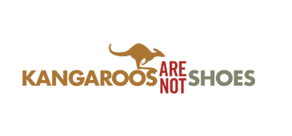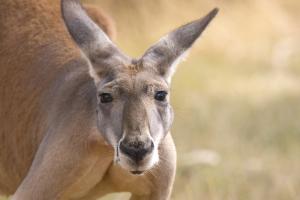Adidas Announces End to Sourcing Kangaroo Skins for Athletic Shoes

KANGAROOS ARE NOT SHOES
Wayne Pacelle of the Center for a Humane Economy makes case for action at Annual Shareholder Meeting, and adidas CEO announced a permanent exit from the trade
The announcement completes the run of new policies against kangaroo killing, driven by the Kangaroos Are Not Shoes campaign, by the Center for a Humane Economy – with Diadora, Puma, Nike, New Balance, and now adidas announcing policies to halt sourcing of skins from the marsupials killed in night-time massacres of adults that also orphan the joeys. The U.K.-based Sokito also announced last year and end to sourcing of kangaroo skins.
Pacelle was accompanied by two German advocates at today’s Annual General Meeting— Milla Widmer of Munich and Vanessa Hagler of Fürth.
"The mass killing of kangaroos has been driven by exports mainly for kangaroo skins,” said Wayne Pacelle, president of the Center for a Humane Economy and Animal Wellness Action. “With adidas exiting the trade, we have shut down sourcing of skins by the world’s top five athletic shoe brands. We now will redouble our efforts to secure similar pledges from Japanese companies ASICS and Mizuno and end this trade once and for all.”
Jennifer Skiff, director of international programs for the Center for a Humane Economy, and before her Mitchell Fox, were leading the campaign for the Center for a Humane Economy, with Donny Moss of Their Turn, SPCA International, Australia’s Animal Justice Party, and so many other determined advocates and mission-aligned organizations battling to raise awareness about the world’s largest mammalian slaughter of native wildlife.
“Adidas’ decision marks a historic milestone in animal protection and corporate responsibility,” said Jennifer Skiff. “This sends a clear message: compassion is not a compromise. Cruelty has no place in commerce.”
Each year, millions of kangaroos are shot at night in Australia—leaving hundreds of thousands of joeys orphaned, bludgeoned, or left to die. Since the launch of the Kangaroos Are Not Shoes campaign in 2020, the Center for a Humane Economy has led investigations, protests, litigation, and international coalition-building to expose the brutal commercial slaughter of kangaroos in Australia. The kill has already dropped from 2 million to 1.3 million, and as these policies go into effect, that kill, driven by foreign demand for kangaroo parts, will decline.
"Adidas has been the most important supporter of the Australian kangaroo kill for years,” said Wayne Pacelle, president of the Center for a Humane Economy. “Its exit from this trade is thrilling news.”
“This win belongs to every advocate who stood outside a store, signed a petition, or raised their voice,” said Donny Moss of TheirTurn, which led dozens of in-store protests against adidas. “Together, we are saving millions of animals.”
"Adidas’ decision is a monumental step toward dismantling the commercial kangaroo industry that has decimated Australia’s iconic wildlife for decades,” said Louise Ward, International Kangaroo Protection Alliance (IKPA). “This victory proves what’s possible when international advocacy unites with grassroots activism. The Center for a Humane Economy’s leadership has been instrumental in driving awareness, shifting industry norms, and protecting vulnerable joeys and their mothers from unconscionable cruelty."
"The brutal commercial slaughter of kangaroos has operated in the shadows for too long,” said Emma Hurst, Member of Parliament, Animal Justice Party, Australia. “Adidas joining its competitors in ending the use of kangaroo leather is not only a win for animals—it’s a win for transparency, ethics, and global consumer expectations. Australians and animal lovers worldwide owe a great deal to the relentless work of the Center for a Humane Economy and the global coalition that made this possible."
As adidas walks away from kangaroo leather, the Center for a Humane Economy vows to continue pushing for laws and corporate practices that replace cruelty with compassion, proving again that helping animals helps us all.
Wayne Pacelle
Animal Wellness Action
+1 443-865-3600
email us here
Legal Disclaimer:
EIN Presswire provides this news content "as is" without warranty of any kind. We do not accept any responsibility or liability for the accuracy, content, images, videos, licenses, completeness, legality, or reliability of the information contained in this article. If you have any complaints or copyright issues related to this article, kindly contact the author above.
The Irish Soda Bread Bible by Eddie O’Sullivan: A Groundbreaking, No-Fuss Guide for Home Bakers
SCA is Proud to Announce a Board Certification Program for First Responder Chaplains
Authentic Global Film Awards Welcomes Dreamers with Cameras And Visionaries June 12th and 13th to Beverly Hills
Kalendarium
Więcej ważnych informacji
 Jedynka Newserii
Jedynka Newserii

 Jedynka Newserii
Jedynka Newserii

Ochrona środowiska

Ostateczny kształt rozszerzonej odpowiedzialności producenta wciąż pod znakiem zapytania. Przykładem dla Polski mogą być rozwiązania z Czech czy Belgii
Zgodnie z wytycznymi Unii Europejskiej do końca 2025 roku Polska powinna osiągnąć poziom recyklingu odpadów opakowaniowych na poziomie min. 65 proc. Trudno to osiągnąć bez wdrożenia systemu rozszerzonej odpowiedzialności producenta (ROP), który w świetle unijnych zaleceń powinien być zaimplementowany już w 2023 roku, a którego ostatecznego kształtu jeszcze nie znamy. Zagraniczni eksperci uważają, że Polska powinna iść w ślady Czech, Belgii i Włoch, stawiając na elastyczną organizację odpowiedzialności producenta (OOP).
Handel
Prof. G. Kołodko: Trump osiągnie efekt odwrotny od zamierzonego i spowolni rozwój Ameryki. Na wojnie handlowej z resztą świata to Stany mogą tracić najmocniej

– Liczne decyzje prezydenta Trumpa, nie tylko na polu ekonomicznym, są po prostu oparte na nieracjonalnych przesłankach, są fałszywe, są szkodliwe i dla Stanów Zjednoczonych, i dla innych, mówiąc językiem popularnym, są chore – ocenia prof. Grzegorz Kołodko, były minister finansów, i wskazuje m.in. na chaos spowodowany wprowadzaniem, zawieszaniem i przywracaniem ceł. Ekonomista w książce „Trump 2.0. Rewolucja chorego rozsądku” analizuje trumponomikę, a więc ekonomię i politykę gospodarczą pomysłu prezydenta oraz jej wpływ na gospodarkę, przestrzega przed zagrożeniami i wskazuje sposoby wyjścia z nasilającego się globalnego zamieszania. Autor ocenia też negatywnie pozaekonomiczne aspekty działalności amerykańskiego prezydenta z wyjątkiem jednego aspektu.
Farmacja
Samoleczenie generuje w UE oszczędności na poziomie 40 mld euro rocznie. Dzięki temu odciążone są europejskie systemy zdrowotne

Każdego roku Europejczycy leczą samodzielnie ok. 1,2 mld drobnych dolegliwości, w tym przeziębienie czy niestrawność. Zdaniem ekspertów wzmocnienie tych kompetencji społeczeństwa może być remedium na braki kadrowe w opiece zdrowotnej i jej deficyt budżetowy. Sięganie po leki bez recepty (OTC), suplementy diety i wyroby lecznicze pozwala uniknąć ok. 120 mln konsultacji lekarskich w skali roku, co odpowiada pracy nawet 36 tys. lekarzy pierwszego kontaktu. Samoleczenie generuje w UE oszczędności na poziomie 40 mld euro rocznie – wynika z danych przedstawionych podczas 61. konferencji AESGP, która odbyła się w Warszawie.
Partner serwisu
Szkolenia

Akademia Newserii
Akademia Newserii to projekt, w ramach którego najlepsi polscy dziennikarze biznesowi, giełdowi oraz lifestylowi, a także szkoleniowcy z wieloletnim doświadczeniem dzielą się swoją wiedzą nt. pracy z mediami.









.gif)

 |
| |
| |
|